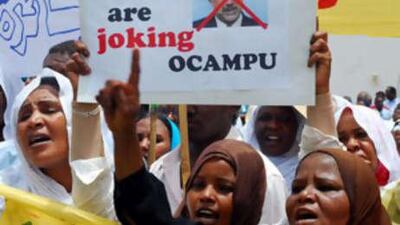AMSTERDAM // The International Criminal Court's (ICC) prosecutor looks poised to seek the arrest of Sudan's president today for alleged war crimes in Darfur in a move Khartoum warns could set fire to the region. A senior European diplomat said on Friday the prosecutor would likely ask for an arrest warrant for the president, Omar Hassan al Bashir, the first sitting head of state to be indicted by an international court since Liberia's Charles Taylor in 2003.
Sudan has said any such move could undermine the peace process in Darfur and aid officials fear a potential backlash. The Darfur investigation could also embarrass Sudan's close ally China just weeks before the start of the Beijing Olympics. Sudan looks set to seek Chinese, Russian and African support at the United Nations to help block any warrant. Aid organisations have tightened security in Sudan in anticipation of an indictment, which could also impact the deployment of an international peace force in Darfur - home to the world's largest humanitarian operation.
Luis Moreno-Ocampo, the ICC Prosecutor, will submit to judges "evidence on crimes committed in the whole of Darfur over the last five years" and seek to charge an individual or individuals, his office said on Thursday, but gave no details. The Washington Post quoted UN officials and diplomats as saying he will charge Mr Bashir with genocide and crimes against humanity. Washington accuses the Khartoum government of genocide in Darfur, a charge it flatly denies.
Thousands of protesters chanted anti-American slogans as they rallied in Khartoum yesterday to protest against a potential arrest warrant, which Abdel Basit Sabderat, Sudan's justice minister told the crowd would ignite his country. "This indictment may well shut off the last remaining hope for a peaceful settlement for the country," said Andrew Natsios, former US special envoy for Sudan.
Mr Moreno-Ocampo said last month that Sudan's "entire state apparatus" was involved in an organised campaign to attack civilians in Darfur and said he would present judges with evidence implicating senior Sudanese officials in July. The ICC was set up in 2002 as the world's first permanent war crimes court. As well as Darfur, it is investigating Uganda, Central African Republic and the Democratic Republic of Congo but has no police force and only has four suspects in custody.
The Sudan case comes at a difficult time for the fledgling court after judges threw its first trial into doubt amid concerns a Congolese militia leader could be denied a fair trial as the prosecution had withheld evidence from the defence. ICC judges issued arrest warrants for two Sudanese suspects last year - government minister Ahmed Haroun and militia commander Ali Kushayb. Khartoum refuses to hand them over.
International experts say at least 200,000 people have died in Darfur and 2.5 million have been displaced since a rebellion erupted in 2003. Khartoum says 10,000 people have been killed. Ban Ki-moon, the UN's secretary general, spoke to Mr Bashir on Saturday and stressed the independence of the ICC but also the need to manage the situation on the ground, expressing concern about any impact on the deployment of U.N. peacekeepers.
Sudan's main rebel groups, who have also been accused of rights abuses, have said any ICC arrest warrant for Mr Bashir would be a triumph for justice, and pledged to hand over their own commanders if sought by the court. Judges will probably take several weeks or months to rule on the likely application for new arrest warrants. Sudan's allies could press the UN Security Council, which referred the situation in Darfur to the ICC for investigation in 2005, to pass a resolution suspending a warrant or inquiry for a year, although Western powers would be unlikely to support that.
*Reuters

